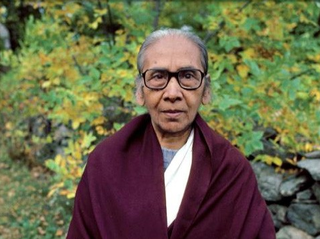A Quote by Francois Fenelon
Simplicity brings back the joys of Paradise. Not that we have pure pleasure without a moment's suffering, but when we are surrendered to God, we are not grasping for pleasure, and even our troubles are received with thanksgiving. This inner harmony, and this deliverance from fear and the tormenting desires of self, create a satisfaction in the soul which is above all the intoxicating joys of this world put together.
Related Quotes
At the heart of our desires is eternal happiness without the slightest hint of misery. You could say that we are pleasure seekers; however, seeking pleasure from the objects of our five senses produces fleeting moments of pleasure whereas, pleasure of one's self, a soul, is eternal and ever-increasing pleasure.
It is important to distinguish between sense-pleasure and sense-desire. There is nothing wrong with sense-pleasure. Pleasure and pain are part of our human experience. Sense-desire, on the other hand, is the grasping at pleasure or the avoidance of pain. This is what creates suffering-grasping and avoidance.
It's easy for us to feel separate from other people and from other forms of life, especially if we don't have a reliable connection to our own inner world. Without insight into our internal cycles of pleasure and pain, desires and fears, there is a strong sense of being removed, apart or disconnected. When we do have an understanding of our inner lives, it provides an intuitive opening, even without words, to the ties that exist between ourselves and others.
With a thousand joys I would accept a nonacademic job for which industriousness, accuracy, loyalty, and such are sufficient without specialized knowledge, and which would give a comfortable living and sufficient leisure, in order to sacrifice to my gods [mathematical research]. For example, I hope to get the editting of the census, the birth and death lists in local districts, not as a job, but for my pleasure and satisfaction.
Most of us love a non-self, or something extrinsic and apart from our inner life; but a mother's love during the time she is a flesh-and-blood ciborium is not for a non-self but for one that is her very self, a perfect example of charity and love which hardly perceives a separation. Motherhood then becomes a kind of priesthood. She brings God to man by preparing the flesh in which the soul will be implanted; she brings man to God in offering the child back again to the Creator.
The greatest joys and the greatest sorrows we experience are in family relationships. The joys come from putting the welfare of others above our own. That is what love is. And the sorrow comes primarily from selfishness, which is the absence of love. The ideal God holds for us is to form families in the way most likely to lead to happiness and away from sorrow.
When you're comfortable and secure, it's not enough. The mind doesn't stop there because it has to continue to focus itself as this body, so it moves to pleasure. And pleasure really is a non-existent thing. When we're experiencing pleasure, we're trying to hold onto it as it leaves, so it really isn't pleasure. Pleasure is pain because we're grasping.
I perceive we postpone all our joys of Christ, till He and we be in our own house above, thinking that there is nothing of it here to be sought or found, but only hope and fair promises; and that Christ will give us nothing here but tears, sadness, crosses; and that we shall never feel the smell of the flowers of that high garden of paradise above, till we come there. Nay, but I find it possible to find young glory, and a young green paradise of joy even here. We dream of hunger in Christ's house, while we are here, although He alloweth feasts to all the bairns within God's household.






































